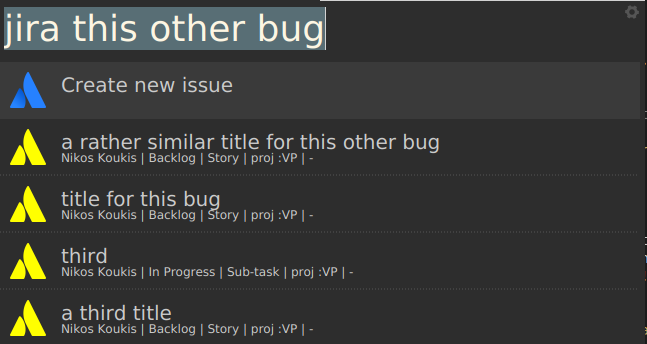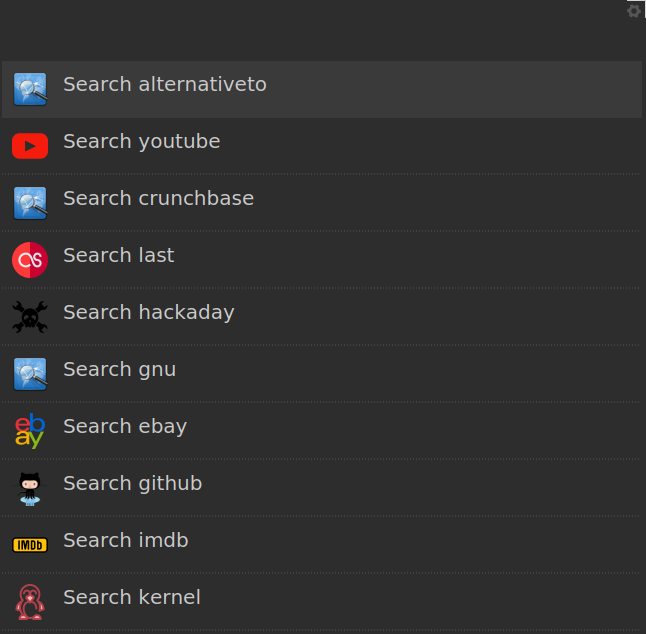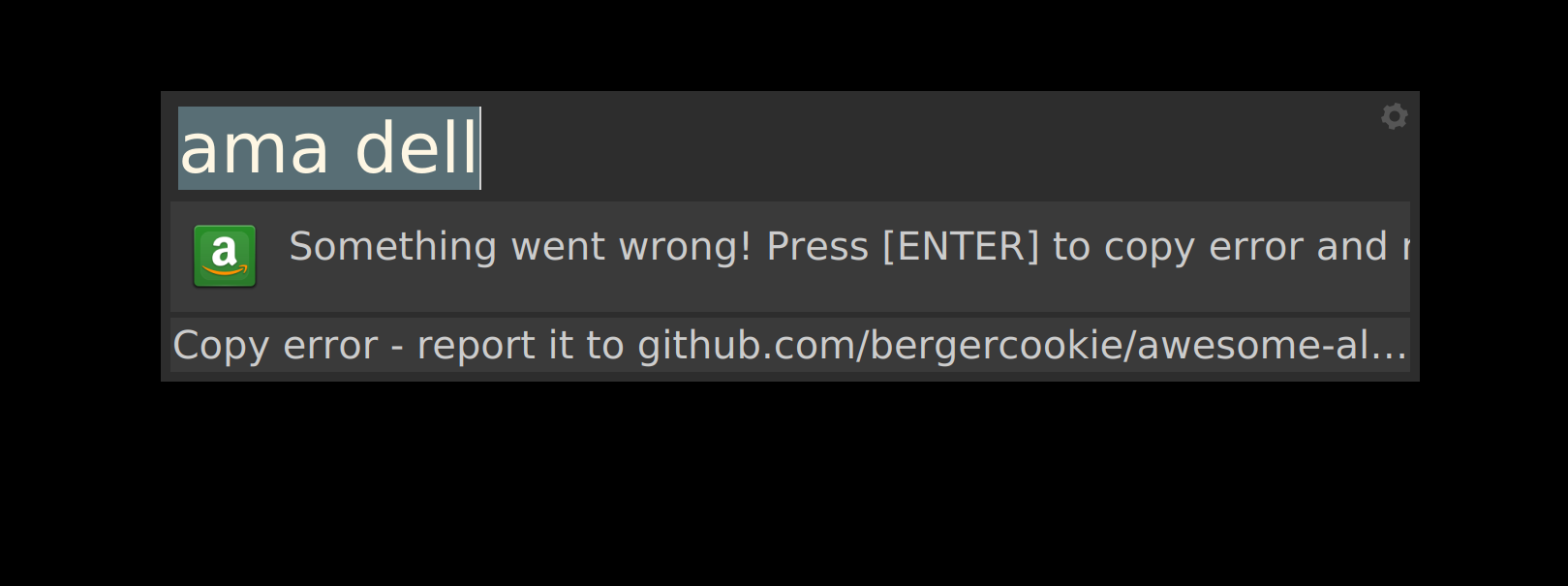I’ve lately been very active developing plugins for the Albert launcher for many parts of my daily routine. For those of you that don’t know it, Albert is an application launcher for Linux. It’s written in C++ and its GUI is built on top of Qt. The current post is a short summary of the plugins I’ve implemented to automate parts of my current routine and maximise my productivity along with advise and, hopefully, useful information on how to do the same for your needs via Albert.
If you want to extend Albert’s capabilities you basically have two options:
- Implement a native Albert plugin in C++. For this you have to clone the Albert repository, implement and compile your plugin along with the overall repo.
- Alternatively you can write a python extension. The latter can be developed separately from the main Albert repo and can be enabled/disabled via an option in the application settings. This goes without saying that, if you’re comfortable with Python and you’re willing to sacrifice a tiny bit of performance when the plugin is running, then this should be your go-to choice.
In my case, I followed the latter approach and in the last ~3 months I implemented a series of plugins to automate parts of my daily routine. All the plugins as well as the overall content of this article can be found in the awesome-albert-plugins repo. Following is a list of the plugins I implemented, along with a short description of what each plugin does:
Jira: Mark tickets as in-progress/under-code-review/done, do fuzzy search on their title, navigate to the corresponding ticket page
Taskwarrior: Interact with taskwarrior - fuzzy search on title, change status of task
Zoopla - Search Property to Buy, Rent, House Prices
Xkcd - Fetch xkcd comics - do fuzzy search on title
Google Maps - Fetch instructions from/to a specific place, optionally via specific transportation means
Suggestions-enabled search for various websites using googler. For example:
Google Amazon Youtube Github Ebay IMDB …
Here are some demo pictures of these plugins:
|  |
|  |
|
|
|  |
|  |
|
|
|  |
|  |
|

Do a fuzzy search of your assigned JIRA tickets

View of many suggestions-enabled saerch plugins
Since I spent a good deal of time writing these plugins, I figured I could share some of my conclusions, shortcuts into writing a new plugin for your own usecases:
Use cookiecutter to minimise the boilerplate code for your new plugin. The former uses the Jinja templating language to substitute placeholder values in the contents of files and in the names of the files and directories. Here’s the cookiecutter package layout that I have been using for spawning new Albert plugins:
cookiecutter/ ├── cookiecutter.json ├── {{cookiecutter.plugin_name}} │ ├── __init__.py │ ├── install-plugin.sh │ ├── misc │ │ └── demo.gif │ └── README.md └── README.mdAnd here are the modifiable variables when creating a new plugin:
1 2 3 4 5 6 7 8 9 10 11{ "author": "Nikos Koukis", "plugin_name": "albert_plugin", "parent_repo_url": "https://github.com/bergercookie/awesome-albert-plugins", "repo_base_url": "https://github.com/bergercookie/awesome-albert-plugins/blob/master/plugins/", "download_url_base": "https://raw.githubusercontent.com/bergercookie/awesome-albert-plugins/master/plugins/{{ cookiecutter.plugin_name }}/", "plugin_short_description": "Some title for your plugin", "albert_plugin_interface": "v0.2", "version": "0.1.0" }Give the user an easy way of raising issues and bugs
When using an albert plugin (or a general-purpose python script) many things can go wrong at runtime (HTTP connection errors, filesystem errors etc.). Moreover, the potential plugin user may be running albert on the background, without having access to the corresponding pseudoterminal it was launched from. This is why, in case of an error, the plugin will silently fail. Here’s a snippet of code that I’ve been using so that errors are not left unnoticed as well as an easy way for the user to report the bug:
1 2 3 4 5 6 7 8 9 10 11 12 13 14 15 16 17 18 19 20 21 22 23 24import traceback if query.isTriggered: try: # whatever your pugin does goes here # ... except Exception: # user to report error results.insert( 0, v0.Item( id=__prettyname__, icon=icon_path, text="Something went wrong! Press [ENTER] to copy error and report it", actions=[ v0.ClipAction( f"Copy error - report it to {__homepage__[8:]}", f"{traceback.format_exc()}", ) ], ), ) return resultsNow, in case an exception is raised during runtime, the user is greeted with the following message:

And when pressing ENTER, the appropriate ISSUES page URL is copied to the clipboard.
Have a setup phase for checking that all the requirements for your plugin are in place
In case more setup steps are required (e.g., login credentials) that can happen as part of the first albert plugin run(s). In my case, I’ve been using a
setupfunction called at the start of the plugin that checks that all the requirements are in-place before actually going through the main plugin functionality. Here’s a sample of how the setup phase works for the JIRA plugin:1 2 3 4 5 6 7 8 9 10 11 12 13 14 15 16 17 18 19 20 21 22 23 24 25 26 27 28 29 30 31 32 33 34 35 36 37 38 39 40 41 42 43 44 45 46 47 48 49 50 51 52 53 54 55 56 57 58 59 60 61 62 63 64 65 66 67 68 69 70 71 72 73 74 75if query.isTriggered: try: results_setup = setup(query) if results_setup: return results_setup # setup OK. user = load_data("user") server = load_data("server") api_key = load_api_key() ... def setup(): results = [] if not shutil.which("pass"): results.append( v0.Item( id=__prettyname__, icon=icon_path, text=f'"pass" is not installed.', subtext='Please install and configure "pass" accordingly.', actions=[ v0.UrlAction('Open "pass" website', "https://www.passwordstore.org/") ], ) ) return results # user if not user_path.is_file(): results.append( v0.Item( id=__prettyname__, icon=icon_path, text=f"Please specify your email address for JIRA", subtext="Fill and press [ENTER]", actions=[v0.FuncAction("Save user", lambda: save_data(query.string, "user"))], ) ) return results # password (same for API key) if not server_path.is_file(): results.append( v0.Item( id=__prettyname__, icon=icon_path, text=f"Please specify the JIRA server to connect to", subtext="Fill and press [ENTER]", actions=[ v0.FuncAction( "Save JIRA server", lambda: save_data(query.string, "server") ) ], ) ) return results # ... def save_data(data: str, data_name: str): """Save a piece of data in the configuration directory.""" with open(config_path / data_name, "w") as f: f.write(data) def load_data(data_name) -> str: """Load a piece of data from the configuration directory.""" with open(config_path / data_name, "r") as f: data = f.readline().strip().split()[0] return dataThus, in this case, on the fist run, the user will have to write their username and server on the albert prompt, which will be saved in appropriate files, and in the following 2 plugin runs, the plugin will check that their password and API key can be appropriately found using the Pass password manager.
Give the user an easy way of installing the plugin.
Along with each new albert plugin, I’ve been adding (again generating it via cookiecutter) an
install-plugin.shscript that sets up all the plugin dependencies via either the system package manager (e.g.,apt-get) or the language package manager (i.e.,pip) and also copies the plugin directory to the local albert modules installation, i.e.:~/.local/share/albert/org.albert.extension.python/.
That’s all for now. Let me know if this has been helpful or has given you any inspiration for making your own extensions.
